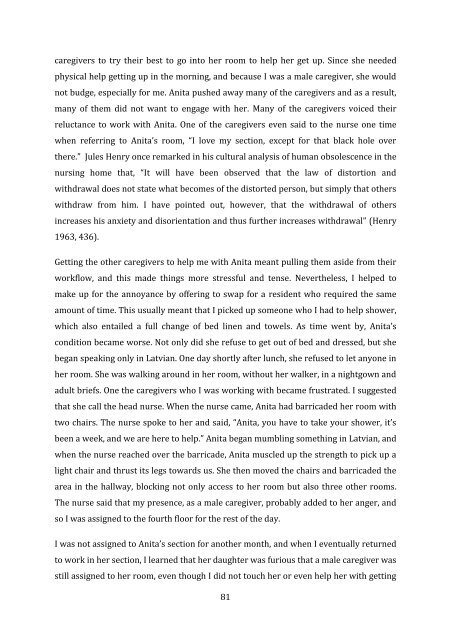Philip Y. Kao PhD thesis - Research@StAndrews:FullText
Philip Y. Kao PhD thesis - Research@StAndrews:FullText
Philip Y. Kao PhD thesis - Research@StAndrews:FullText
You also want an ePaper? Increase the reach of your titles
YUMPU automatically turns print PDFs into web optimized ePapers that Google loves.
caregivers to try their best to go into her room to help her get up. Since she needed<br />
physical help getting up in the morning, and because I was a male caregiver, she would<br />
not budge, especially for me. Anita pushed away many of the caregivers and as a result,<br />
many of them did not want to engage with her. Many of the caregivers voiced their<br />
reluctance to work with Anita. One of the caregivers even said to the nurse one time<br />
when referring to Anita’s room, “I love my section, except for that black hole over<br />
there.” Jules Henry once remarked in his cultural analysis of human obsolescence in the<br />
nursing home that, “It will have been observed that the law of distortion and<br />
withdrawal does not state what becomes of the distorted person, but simply that others<br />
withdraw from him. I have pointed out, however, that the withdrawal of others<br />
increases his anxiety and disorientation and thus further increases withdrawal” (Henry<br />
1963, 436).<br />
Getting the other caregivers to help me with Anita meant pulling them aside from their<br />
workflow, and this made things more stressful and tense. Nevertheless, I helped to<br />
make up for the annoyance by offering to swap for a resident who required the same<br />
amount of time. This usually meant that I picked up someone who I had to help shower,<br />
which also entailed a full change of bed linen and towels. As time went by, Anita’s<br />
condition became worse. Not only did she refuse to get out of bed and dressed, but she<br />
began speaking only in Latvian. One day shortly after lunch, she refused to let anyone in<br />
her room. She was walking around in her room, without her walker, in a nightgown and<br />
adult briefs. One the caregivers who I was working with became frustrated. I suggested<br />
that she call the head nurse. When the nurse came, Anita had barricaded her room with<br />
two chairs. The nurse spoke to her and said, “Anita, you have to take your shower, it’s<br />
been a week, and we are here to help.” Anita began mumbling something in Latvian, and<br />
when the nurse reached over the barricade, Anita muscled up the strength to pick up a<br />
light chair and thrust its legs towards us. She then moved the chairs and barricaded the<br />
area in the hallway, blocking not only access to her room but also three other rooms.<br />
The nurse said that my presence, as a male caregiver, probably added to her anger, and<br />
so I was assigned to the fourth floor for the rest of the day.<br />
I was not assigned to Anita’s section for another month, and when I eventually returned<br />
to work in her section, I learned that her daughter was furious that a male caregiver was<br />
still assigned to her room, even though I did not touch her or even help her with getting<br />
81
















